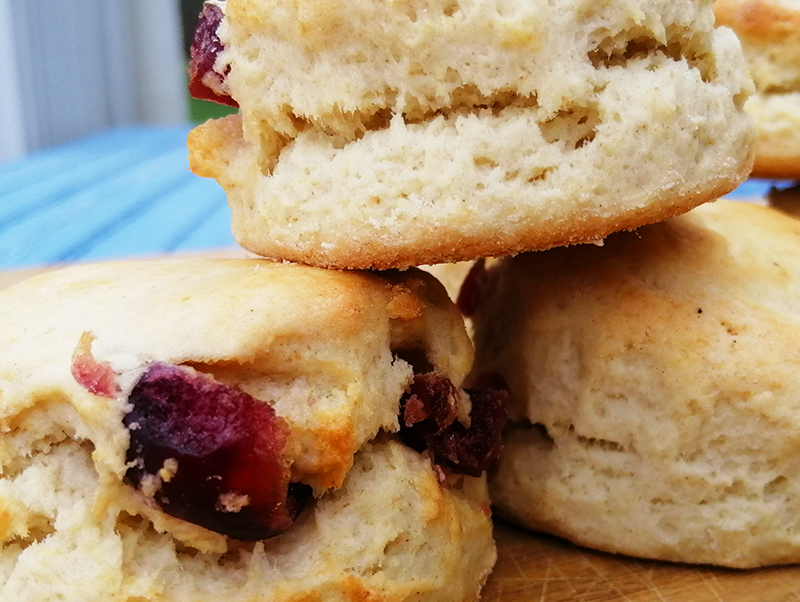
These scones are light and easy to make, and use ingredients you’re likely to have in stock.
Scones are, of course, really adaptable, if you feel like adding raisins, cranberries, or anything else you can find in the cupboard.
Half of this batch were made with natural-coloured glace cherries, which make them more of a treat, but there is something lovely about a plain old-fashioned scone, too.

The pictured scones were made with white flour, but I’ve made these with a 50/50 mix of white and wholemeal before, which also works very well.
It’s such a basic recipe, I wondered whether to post this, but I’ve had several vegan scones in cafes recently that were either dense or overloaded with raising agents (or full of vanilla essence, for some reason), and it’s really not difficult to make a traditional scone that is light without giving your tongue pins and needles.
The one important thing to remember, if you’re not already a seasoned scone-maker, is not to overdo the mixing when you add the milk.
This recipe will make twelve small scones like those pictured or six to eight large scones.

light vegan scones…
ingredients
- 300 g white self-raising flour (or a 50/50 mix of white and wholemeal)
- 1 tsp baking powder
- 90 g soft vegan margarine
- 45 g caster sugar
- 1/8 tsp salt (optional)
- 130 ml oat (or other non-dairy) milk
- 1 tbsp lemon juice
- up to 100 g cherries or other dried fruit (optional)
method
- Set the oven to 200°C/400°F and line or very lightly oil a large baking sheet.
- Sift the flour, baking powder and salt into a large bowl and add the sugar and margarine.
- Using a pastry blender, or your fingers if you prefer, rub the mixture until it is sandy and there are no little lumps of margarine (this will take a good few minutes).
- In a separate jug or bowl, stir the lemon juice into the oat milk. Depending on what kind of milk you use, it will take on the consistency of thin yoghurt.
- If you are adding dried fruit, stir this through the flour mixture until evenly distributed.
- Make a well in the dry ingredients and pour in the milk mixture. Turn and stir with a large spoon or fork until evenly combined, but don’t over-mix.
- Transfer the mixture to a lightly floured board and roll it to a thickness of around 2 cm.
- Stamp out rounds with a pastry cutter and place these on the baking tray. The pictured scones were made with a 5 cm cutter. You can brush them with a little plant milk for a slight sheen on top, but it’s not essential.
- Bake for 12 to 15 minutes until they are well risen and turning a light golden brown on top.
- They are probably best eaten warm but will store for a day or two in a tin.

If you would like to receive e-mail alerts when new recipes are published, please see my contact page.